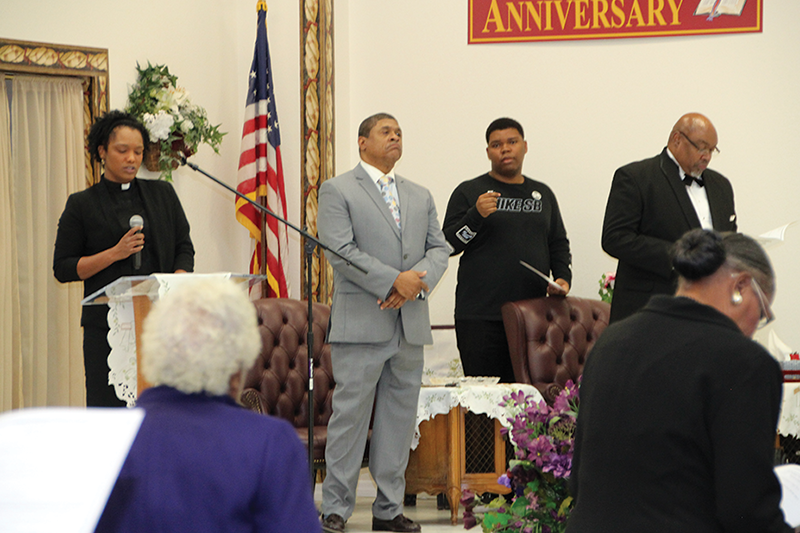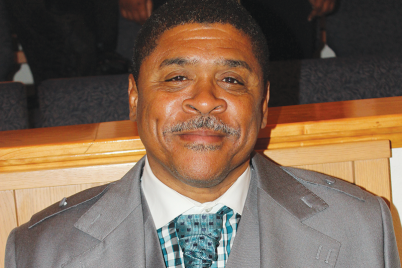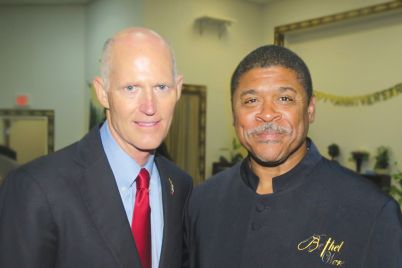BY ALLEN A. BUCHANAN, Staff Writer
PETERSBURG – Bethel Community Baptist Church celebrated their 95th anniversary Sunday, Oct. 28 with featured speaker Apostle J. L. Cashe along with his praise team from Orlando.
The Roaring Twenties opened the door to the Harlem Renaissance and also the proliferation of black churches, especially in the Deep South.
In 1923, Baptist churches such as the Georgia Baptist Church in St. Pete were opening their doors not only for worship but also for galvanizing the black community spiritually and for future social change.
Well, door is a bit of an exaggeration, services for Georgia Baptist Church were held in a tent located on Fifteen Street and Pinellas Lane. A council was summoned to give the church official sanction.
Later that same year, the named was changed to Second Bethel Baptist Church under the leadership of council members W.H. Pelham, L.A. Berry and George Griffin. Rev. L.M. Martin served as the first pastor from 1923-25, and under his direction, a building was erected at Fifth Avenue an Sixteenth Street.
From 1925-26 Rev. John Henry Lewis served as pastor followed by Rev. D.M. Brooks from 1926-30.
In 1932, Rev. Enoch D. Davis took over the reins as senior pastor, changing the name of the church to Bethel Community Baptist Church, where he remained as pastor for 52 years.
During his tenure, Rev. Davis was an activist, author and civil rights leader in St. Pete where he challenged Jim Crow segregation policies. During the struggle for civil rights, Rev. Davis worked to end busing and school segregation, employee discrimination, fought to win voting rights for blacks, open the city’s beaches and public pools to the black community and led his share of sit-ins at lunch counters and theaters.
Under Rev. Davis’ leadership, an Educational Wing was added; the church received modernistic pews and an organ. A parsonage was built, and an 84-unit low rent housing project was constructed. Davis retired in 1984, and the Enoch Davis Center was named in his honor a few years before his death in 1985.
From 1984 to 1993, four ministers served as church leaders: Rev. Gregory Wallace (pastorate 1984-85), Rev. Walter Williams (1985-86), Rev. Howard W. Jones (pastorate 1986-1991) and Rev. A. Roger Williams (interim pastor 1991-1993).
In 1993, Rev. Manuel L. Sykes took over as spiritual leader of Bethel Community. In 1995, the church closed on nearly 25 acres of land of 54th Avenue South. A new edifice and school were erected shortly thereafter.
After twenty-five years as the pastor of one of the largest historic black churches in St. Pete, Pastor Sykes contemplated retiring but has agreed to remain for another five years.
“Having the heart for the people, the congregation and feeling the support of most of them, you know that encourages you to stay,” said Pastor Sykes.
“I’ve never heard of a people coming together and requesting the pastor to stay,” said Rev. Sykes. “Usually you’ll have individuals who will come to you, but the way they did it was totally unexpected. They didn’t see me in the same light that I saw myself.”
Pastor Sykes had trouble seeing what an awesome leader he was or his ability to please his congregation. One valued quality to look for in a good leader is the ability to be flexible. Pastor Sykes realized his method of teaching conflicted with the learning style of his congregation and set out to do something about it.
“I realized I was verbal in delivering the word, and Bethel was more visual,” he said, revealing that he had to rework his delivery.
“That gave me a new determination to develop a way of speaking to the congregation in a way that they could tangibly understand because if I’m verbal and I don’t show them with visual language, then there’s too much room for error.”
Pastor Sykes stated that under his leadership in the next five years, he would like to “burn the mortgage, expand the church, including a senior citizen living facility, and to recondition and add on to the school.”
“As you build the physical church in its beauty and its size, you do the same thing for its people. We’re building a people as well as a church with an openness for diversity, a culture of inclusion and concern for one another,” he finished.
To reach Allen Buchanan, email abuchanan@theweeklychallenger.com








